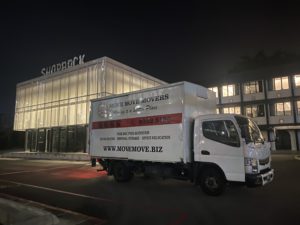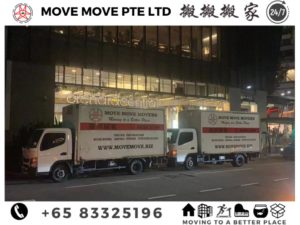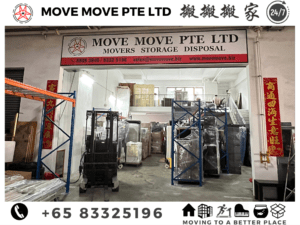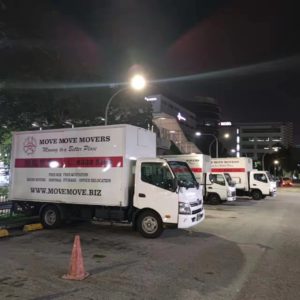
Singapore’s logistics & delivery industry is developing rapidly
Singapore’s logistics and delivery industry is booming, driven by e-commerce growth and smart supply chain solutions
Since the 1990s, the modern logistics industry has developed rapidly in the world, maintaining a high-speed growth of 20% to 30% for 10 consecutive years, making it known as the three sunrise industries together with the high-tech and financial industries. With its unique geographical advantages and government policy guidance, Singapore has developed into one of the world’s recognized logistics centers.

As a free trade city, Singapore has developed and perfect sea and air transportation and telecommunication networks. On this basis, Singapore’s logistics industry has developed rapidly in recent years. As of 2001, the logistics industry accounted for 8% of Singapore’s GDP, and the number of employees in logistics-related industries reached 92,000, accounting for 5% of the country’s total labor force. World-renowned logistics companies, such as DHL, FedEx and Zink, have set up regional headquarters in Singapore. The modern logistics industry has become one of the pillar industries in Singapore. Singapore’s logistics industry presents the following six characteristics:
As a free trade city, Singapore has developed and perfect sea and air transportation and telecommunication networks. On this basis, Singapore’s logistics industry has developed rapidly in recent years. As of 2001, the logistics industry accounted for 8% of Singapore’s GDP, and the number of employees in logistics-related industries reached 92,000, accounting for 5% of the country’s total labor force. World-renowned logistics companies, such as DHL, FedEx and Zink, have set up regional headquarters in Singapore. The modern logistics industry has become one of the pillar industries in Singapore. Singapore’s logistics industry presents the following six characteristics:
Logistics companies in Singapore have obvious common characteristics: they either specialize in providing a full range of logistics services for enterprises in a certain industry, or provide logistics services in a certain link for customers in various industries, such as supply chain services. The specificity of service is an important reason why Singapore logistics companies can provide high-quality services. Taking the local Accord logistics company in Singapore as an example, in order to successfully complete the professional distribution service of the Swedish skf company in the Asia-Pacific region, Accord set up a special warehouse for skf.
The logistics enterprises in Singapore are generally strong, which is mainly due to the favorable development environment created by the Singapore government, which has attracted the attention of many international famous logistics companies, so that they have set up their Asian regional headquarters in Singapore, including the United States, the world leader in the logistics industry. United Parcel and the second child FedEx. The strong strength of these global logistics giants in terms of capital, transportation tools and management level has promoted the rapid development of Singapore’s local logistics industry.

Singapore’s logistics industry fully embodies the meaning of “efficient”, which is not only due to the superior geographical location of the Singapore Logistics Park (adjacent to the airport and easy access to traffic), but also because of its unimpeded links. Taking the customs clearance procedure as an example, the Singapore government uses the “trade network” to achieve paperless customs clearance.
With the vigorous development of the modern logistics industry in Singapore, the scope of logistics services is unprecedented, and the logistics industry has developed in the direction of “tailor-made”. In the past, Singapore logistics companies provided customers with a certain fixed model of services. Now, these companies have turned to “tailor-made” services to meet customer needs as the starting point and the final destination. One or several most ideal service methods, and finally find out the solution that can provide customers with low cost to the greatest extent.
Singapore logistics companies have basically realized the automation of the entire operation process. They are equipped with high-tech storage equipment, fully automatic three-dimensional warehouses, wireless scanning equipment, automatic storage systems and other modern information technology equipment. It can be said that high technology is one of the main supporting forces of Singapore’s logistics industry, and network technology is the top priority.
Network technology mainly includes the government’s public network system and the computer technology platform of logistics enterprises. The Singapore government launched the “Trade Network” system to realize online information exchange between enterprises and government departments. In addition to the public network provided by the government, logistics companies have successively invested millions of dollars to build computer technology platforms. Through this technology platform, customers can not only make business contacts such as placing orders, but also know the real-time spatial location of the delivered goods through the company’s network and the delivery link of the goods at that time at any time after the consigned goods enter the company’s operation. and estimated delivery time.
Modern technology also ensures the safety of the cargo. In the specific operation process of each logistics company, barcodes and wireless scanners provide a guarantee for the safety of goods, so that the delivery accuracy rate of up to tens of millions of goods every day exceeds 99.99%.
Modern logistics is one of the pillar industries of Singapore and one of the important economic lifelines of the country. In order to build Singapore into an Asian logistics center, the Singapore government has made great efforts.
The development of the logistics industry planned by the Singapore government can be traced back to 1997. In July 1997, the Singapore Logistics Advocacy Committee formulated a development plan. In the same year, the Singapore Trade Development Board joined 13 government agencies, including the Customs, Economic Development Board, Civil Aviation Authority, Productivity and Standards Authority, Information Development Authority, Maritime and Port Authority, etc. , and launched the “1997 Logistics Industry Improvement and Application Plan”. After the success of the plan, the Singapore government has successively launched the “Logistics Industry Improvement and Application Plan in 1999” and the “2001 Logistics Industry Improvement and Application Plan”. This series of plans has successfully integrated logistics links such as transportation, warehousing and distribution into a “one-stop” service. These plans mainly include the following four contents.
In order to develop efficient and scientific logistics processes, the Singapore government has commissioned expert consultants to carry out a number of studies, while encouraging industry players to actively participate in this activity. Under the leadership of the government, Singapore government consultants successfully completed the “Logistics Industry Challenges and Business Opportunities” and other topics, and the industry has completed research projects such as “pallet standardization”.
After the Singapore government advocated vigorously developing the logistics industry, it immediately launched the logistics infrastructure construction plan. After the Maritime and Port Authority became independent from the government structure in 1997, it was committed to improving the logistics infrastructure: on the one hand, introducing high-tech, including electronic gate systems and fully automated overhead cranes; on the other hand, at Changi Airport A logistics park is opened nearby, attracting international third-party logistics companies to set up new headquarters and regional logistics centers.
In 1999, the Singapore government introduced the latest development of logistics technology knowledge in the form of logistics lectures, and launched a number of logistics talent training programs such as government-school cooperation, international exchanges, and encouraging potential talents from other industries to transfer to logistics. That year, the National University of Singapore and the Georgia Institute of Technology in the United States cooperated to establish the Asia Pacific Institute of Logistics in Singapore, offering a dual master’s degree program. In 2000, the first batch of Asia Pacific College of Logistics students graduated and received the “Certificate of Recognition in Logistics” (cpl).
In 1999, the government formulated a science and technology development program for the logistics industry, with the goal of building public electronic corridors and promoting low-cost electronic data exchange in the industry. So far, the Singapore government has established public electronic platforms such as “Port Network” and “Trade Network”, and will launch an electronic invoice and electronic payment system for the air transport industry and an electronic data interchange system for the air transport industry.

Singapore Air Logistics is represented by Changi International Airport. This airport is known as the most modern international airport in Southeast Asia. It transports more than 20 million passengers every year. It has been rated as “the best airport in the world”, “the best airport in the Asia-Pacific region” and “the most popular airport in the world” for many consecutive years. Wait. The Civil Aviation Authority from time to time discusses and formulates the development plan of Changi Airport to ensure that the airport has sufficient capacity to cope with the strong growth of air traffic in the Asia-Pacific region. Changi Airport has the Changi Air Cargo Center, which covers an area of 47 hectares and is a free trade zone that operates 24 hours a day. This one-stop service center provides the equipment and services needed to load and unload air cargo. Every day, no matter what time of day, the cargo unloaded from the plane is delivered to the consignee in just one hour.
Singapore not only has an excellent deep-water port, but also built four container terminals. The Port of Singapore Group handles more than 15 million containers a year and is the world’s largest single-container terminal operator. Singapore’s long-term goal is to develop the country into an all-round integrated logistics hub integrating sea, land, air and warehousing. To achieve this, the Port of Singapore has recently taken new initiatives. On the one hand, adjust the port management strategy and formulate new measures, prepare to open the port to allow shipping companies to own their own terminals through joint ventures, and welcome international port operating groups to invest in Singapore and develop terminals. On the other hand, it focuses on technological transformation to improve productivity by tapping internal potential. In March 2002, the Maritime and Port Authority of Singapore undertook a pilot program to implement an automatic identification system in the Singapore seaport to avoid collisions and improve port navigation safety. unloaded from the plane is delivered to the consignee in just one hour.

Singapore actively develops public transportation, and controls the growth of private transportation, which is dominated by private cars, with a variety of economic control measures. The public transportation system is complete and diverse, including the large-capacity subway system, light rail system, bus system, and taxi system. It is characterized by wide network coverage and fast and efficient operation. The electronic road toll system is an advanced intelligent road management system that the Singapore government has implemented. The transmission and the central control system are composed. Any vehicle entering the central area will be automatically deducted a certain fee when passing through the system.
By Move Move Movers